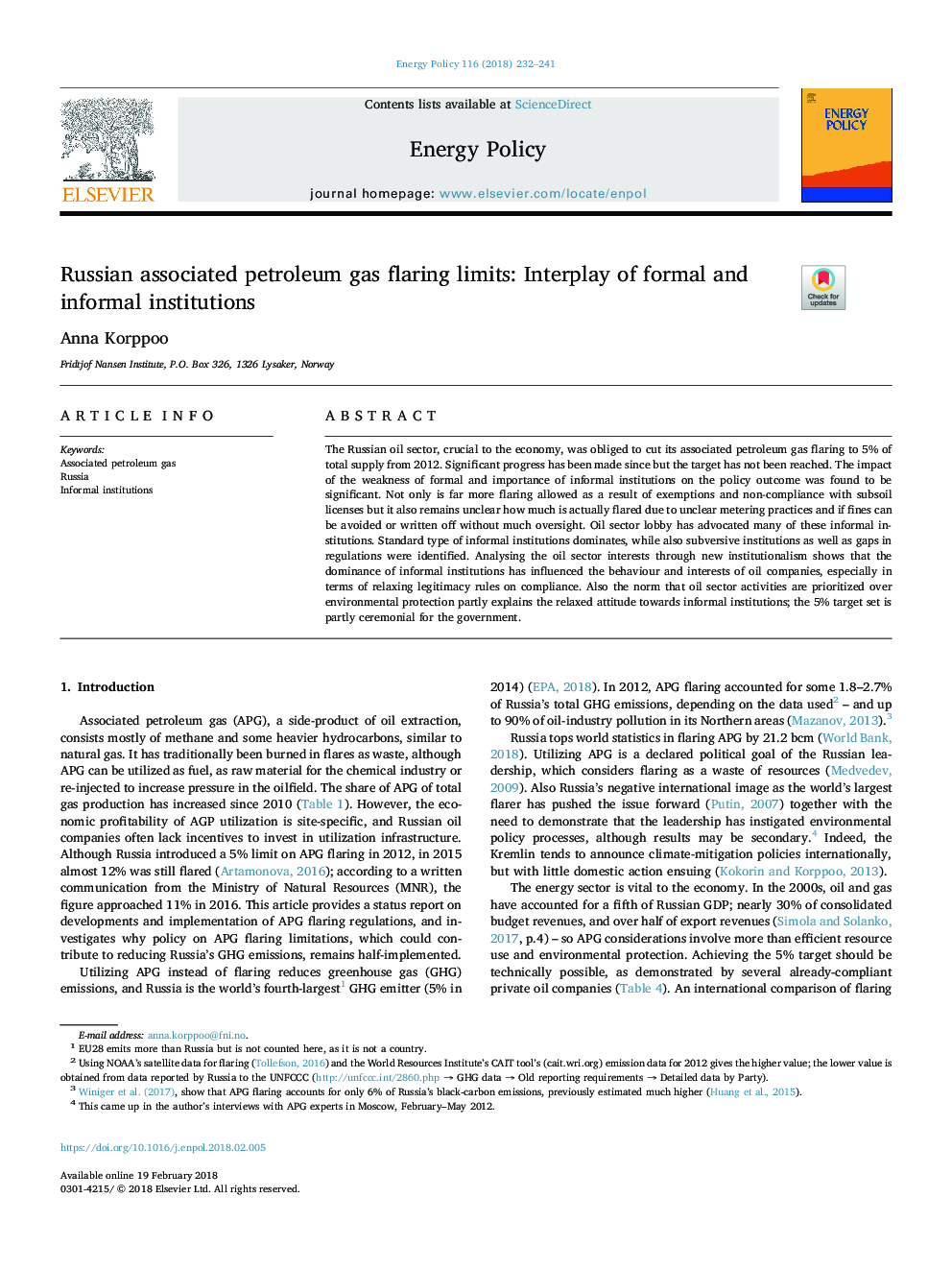| کد مقاله | کد نشریه | سال انتشار | مقاله انگلیسی | نسخه تمام متن |
|---|---|---|---|---|
| 7397413 | 1481242 | 2018 | 10 صفحه PDF | دانلود رایگان |
عنوان انگلیسی مقاله ISI
Russian associated petroleum gas flaring limits: Interplay of formal and informal institutions
ترجمه فارسی عنوان
محدودیت گازهای گلخانه ای وابسته به روسیه: مواجهه با موسسات رسمی و غیر رسمی
دانلود مقاله + سفارش ترجمه
دانلود مقاله ISI انگلیسی
رایگان برای ایرانیان
کلمات کلیدی
گاز وابسته، روسیه، موسسات غیر رسمی،
ترجمه چکیده
بخش نفت روسیه، که برای اقتصاد مهم است، موظف به کاهش گازهای گلخانه ای مرتبط با آن از 5/15 درصد از سال 2012 بوده است. پیشرفت قابل توجهی از زمان انجام شده است، اما هدف نهایی نشده است. تأثیر ضعف رسمی و اهمیت موسسات غیر رسمی در نتیجه سیاست، قابل توجه است. به علت معافیت ها و عدم تطابق با مجوز های زیرزمینی، صرفه جویی در فاضلاب به میزان قابل توجهی امکان پذیر نیست، اما هنوز معلوم نیست چقدر به علت شیوه های اندازه گیری غیرمترقبه، و از جریمه ها جلوگیری می شود و یا بدون نظارت بسیار زیاد می شود. لابی بخش نفت از بسیاری از این موسسات غیر رسمی حمایت کرده است. نوع استاندارد موسسات غیر رسمی غالب است، در حالی که نهادهای متخلف و همچنین شکاف در مقررات مشخص شده است. تجزیه و تحلیل منافع بخش نفت از طریق نهادگرایی جدید نشان می دهد که تسلط نهادهای غیر رسمی بر رفتار و منافع شرکت های نفتی، به ویژه از نظر قوانین مشروعیت بخشیدن به انطباق، تأثیر داشته است. همچنین حاکمیت فعالیت های بخش نفت برای حفاظت از محیط زیست در اولویت قرار دارد و تا حدودی نگرش آرام نسبت به نهادهای غیررسمی را توضیح می دهد؛ تعیین هدف 5٪ برای دولت بخشی است.
موضوعات مرتبط
مهندسی و علوم پایه
مهندسی انرژی
مهندسی انرژی و فناوری های برق
چکیده انگلیسی
The Russian oil sector, crucial to the economy, was obliged to cut its associated petroleum gas flaring to 5% of total supply from 2012. Significant progress has been made since but the target has not been reached. The impact of the weakness of formal and importance of informal institutions on the policy outcome was found to be significant. Not only is far more flaring allowed as a result of exemptions and non-compliance with subsoil licenses but it also remains unclear how much is actually flared due to unclear metering practices and if fines can be avoided or written off without much oversight. Oil sector lobby has advocated many of these informal institutions. Standard type of informal institutions dominates, while also subversive institutions as well as gaps in regulations were identified. Analysing the oil sector interests through new institutionalism shows that the dominance of informal institutions has influenced the behaviour and interests of oil companies, especially in terms of relaxing legitimacy rules on compliance. Also the norm that oil sector activities are prioritized over environmental protection partly explains the relaxed attitude towards informal institutions; the 5% target set is partly ceremonial for the government.
ناشر
Database: Elsevier - ScienceDirect (ساینس دایرکت)
Journal: Energy Policy - Volume 116, May 2018, Pages 232-241
Journal: Energy Policy - Volume 116, May 2018, Pages 232-241
نویسندگان
Anna Korppoo,
